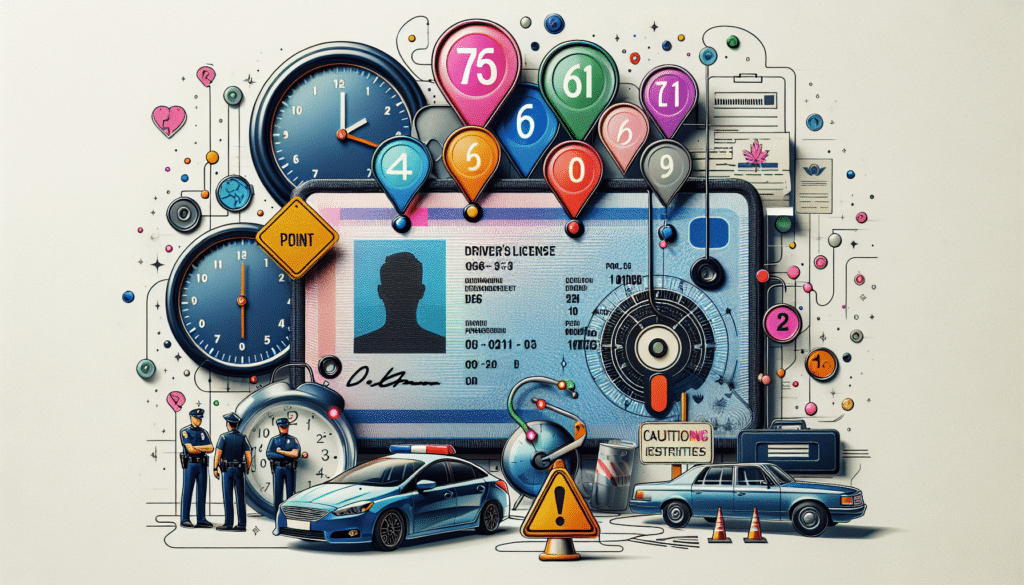Speeding tickets don’t just come with a fine; they also add points to your license. But how many points does a speeding ticket add, and what happens if you collect too many? In this article, we’ll break down what speeding tickets points on license mean, how they impact your driving record, and what you can do about it.
Key Takeaways
Speeding tickets result in points added to your driving record, which vary by state and the severity of the offense, impacting driving privileges and insurance rates.
Accumulating too many points can lead to license suspension or revocation, emphasizing the importance of maintaining a clean driving record to avoid long-term penalties.
Regularly checking and managing your driving record can help mitigate the effects of points, while certain actions like completing driver safety courses may provide avenues for point removal.
How Speeding Tickets Add Points to Your License

Receiving a speeding ticket involves more than just a financial penalty. The Department of Revenue’s point system tracks driving behavior and adds points to your license. For example, Missouri assigns three points for a speeding conviction, recorded upon conviction of the violation.
Most moving violations, such as speeding and running a red light, lead to points on your license. Points are added only after a traffic violation convictions, ensuring that only confirmed infractions impact your driving status.
Every state’s DMV tracks drivers’ records with a points system, assigning values to convictions that impact your driving record. Points are calculated based on the violation date. Accumulating too many points can result in severe consequences like license suspensions and other penalties, so staying informed and proactive is key.
Point Values for Speeding Violations

Point values for speeding violations vary by the severity of the offense. States assign specific points to different traffic offenses, including speeding. Minor speed limit excesses result in fewer points, while severe offenses carry higher points.
Speeding violations carry varying point values based on how much you exceed the speed limit. Exceeding the limit by 10-20 mph adds fewer points than going 30 mph or more over. The maximum point value for a single violation is typically six points. Knowing these values helps you gauge their impact on your driving record.
Knowing these point values is vital, as too many points can result in license suspensions and higher insurance premiums. Awareness of the number of points in the point system allows better management of driving habits to avoid severe penalties.
Impact of Points on Driving Privileges

Too many points on your driving record can lead to serious consequences. States set specific point limits, usually between 10 and 12, and you may wonder how many points can result in license suspension or revocation. Reaching this limit can temporarily or permanently remove your driving rights.
License suspension temporarily restricts your driving privileges, significantly impacting daily life, work, and responsibilities. Driver license suspensions are more severe, involving the complete loss of your license and a complex reapplication process to regain it.
Traffic violations can stay on your record for many years, even after points are removed, typically remaining visible for one to three years. This long-term impact highlights the importance of maintaining a clean driving record.
Effect on Insurance Premiums

Points on your driving record can significantly raise your insurance premiums, as insurers assess your driving risk. Increased points portray higher risk to insurers, leading to higher premiums. Typically, insurers review driving records for the last three to five years when determining rates.
After a speeding ticket, insurance premiums can rise by an average of 25%. The rate increase varies with the severity of the violation. While one speeding ticket may not always trigger a hike, it depends on the insurer’s policies and the violation’s location.
Knowing these factors helps anticipate and manage insurance cost increases. Maintaining a clean driving record is crucial not only for retaining driving privileges but also for keeping insurance premiums affordable.
Checking Your Driving Record
Regularly checking your driving record helps stay informed about your driving status and manage points on your license. Accessing your record online via the DMV usually requires creating an account and paying a small fee, often around $2, allowing you to monitor your record from home.
You can only request your own driving record online, while obtaining someone else’s driver record requires a specific form and a higher fee. Many states offer digital services to request your driving record directly through their DMV website, making it easier to track points or violations.
You may need your driver license number, date of birth, and the last four digits of your Social Security number to access your driving record. Alternatively, you can check your driving record in person at a local DMV office, which may require identification.
When checking your driving record online, have a printer ready, as you usually get only one chance to print it after payment. Regularly reviewing your driving record ensures accuracy and timely action to address any issues.
Removing Points From Your Driving Record
Removing points from your driving record is possible through various methods, depending on state regulations. A common way is completing a state-approved driver safety course, designed to enhance driving skills and promote safe habits.
Some states require drivers to wait before applying for point removal, depending on the violation. Mitigation allows negotiation for reduced penalties or alternative options like attending a driving course. Points stay on a driver’s license for 36 months without further violations before removal.
In some states, expungement of violations from a driving record is possible if specific conditions are met. Completing a state-authorized safe driving course is another effective method for removing points. Proactive steps can reduce the impact of previous violations and maintain a cleaner record.
Interstate Point Transfer
Interstate point transfer complicates managing your driving record. Points from speeding tickets can affect your record in another state if the violations are point-accessible there. However, some states, like New York, may not add points from out-of-state violations, except for Ontario or Quebec.
For instance, Florida adds points from out-of-state tickets to its residents’ driving records. Moving to another state doesn’t erase points; they remain part of your driving history. Additionally, not all speeding violations may be reported by states, causing gaps in driving records.
A ticket from another state can affect your driving record, potentially increasing insurance premiums. Understanding interstate point transfer helps manage your driving record and anticipate impacts.
How to Avoid Accumulating Points
Preventing point accumulation on your license involves adopting safe driving practices. Using cruise control helps maintain a steady speed, reducing accidental speeding. Regularly checking your speedometer ensures awareness and helps prevent unintentional speeding.
Modern GPS devices with speed limit alerts help drivers stay compliant with speed regulations and act as a traffic control device. Adapting to the flow of traffic ensures safe speeds and prevents dangerous driving situations, including the use of a traffic control signal.
Engaging in safe driving practices is crucial for avoiding speeding tickets and point accumulation on your driving privilege.
Fighting Speeding Tickets

When pulled over for speeding, staying calm and cooperative can positively influence the interaction with a police officer. If you receive a traffic ticket, consulting an experienced attorney is advisable. Gathering evidence like dashcam footage or GPS data can strengthen your case.
If the officer who issued the ticket doesn’t appear in court, it may lead to case dismissal. An attorney can explain options and help prepare for contesting a traffic violation.
Hiring a traffic attorney can be beneficial for complex cases or tickets with significant financial consequences.
Summary
In summary, speeding tickets and the points they add to your license have far-reaching effects on your driving record and overall driving privileges. Understanding the point system, the impact on insurance premiums, and methods to check and remove points from your driving record is crucial for maintaining a clean driving status.
By adopting safe driving practices and being proactive in managing your driving record, you can avoid the severe consequences of accumulating too many points. Stay informed, drive safely, and keep your driving record clean to enjoy uninterrupted driving privileges and lower insurance premiums.
Frequently Asked Questions
How do points from speeding tickets affect my driving privileges?
Accumulating too many points from speeding tickets can result in the suspension or revocation of your driving privileges. It is essential to adhere to traffic laws to maintain your license status.
How can I check my driving record?
To check your driving record, visit your local DMV office or access their online portal by creating an account and paying a nominal fee.
Can I remove points from my driving record?
Yes, you can remove points from your driving record by completing a state-approved driver safety course or through expungement, depending on your state’s regulations.




